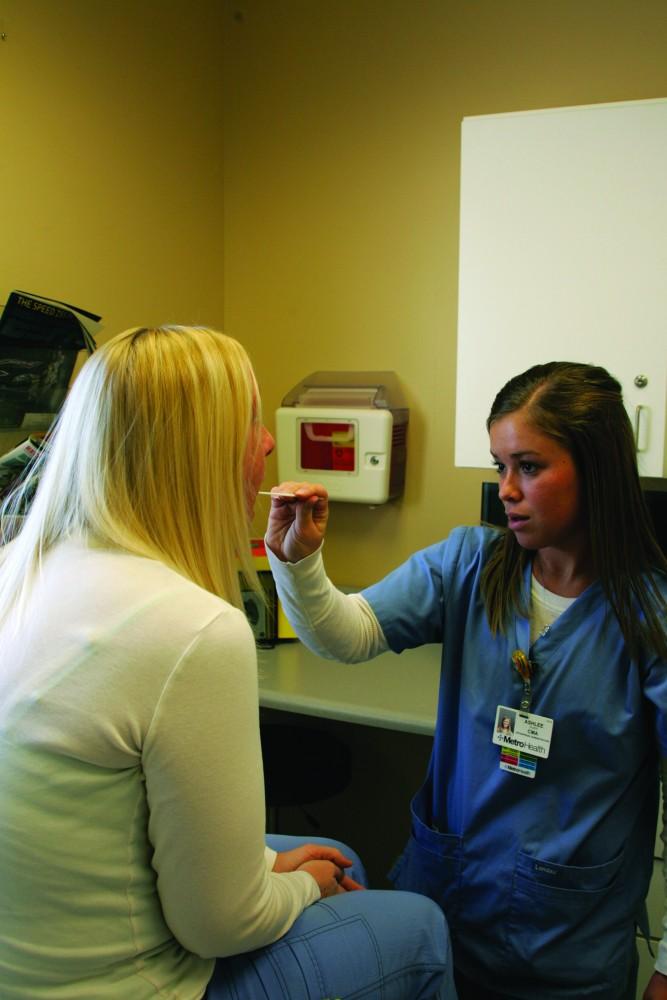Common college illnesses and prevention methods

GVL / Amy Hammond Student nurse Ashlee Olsen checks out a patient in the Health Services Building.
Nov 11, 2012
Chances are, with cold season just around the corner, you might find yourself attempting to dispel the most unpleasant symptoms.
Mostly everyone can agree that washing your hands and not sharing body fluids are effective ways to abstain from getting sick, but those aren’t the only methods. Grand Valley State University nutrition professor Jody Vogelzang said sleep and nutrition can be important to staying healthy.
“Mindful eating and proper sleep usually lends the individual to take care of their bodies in other areas, as well,” Vogelzang said. “There is oftentimes a direct correlation between routine physical activity, sleep and entire self-care. In regard to nutrition, everything you put into your mouth has effect. Focus on everyday mindful health choices on an everyday basis. Failure can cause serious illnesses, so prevention should always be No. 1.”
Vogelzang also said students often have a misconception as to where the energy to fuel the body should come from. Often times, in an effort to stay awake a few more hours while studying for an exam or finishing a paper, students will drink an abundance of caffeine, which hypes up the body and later on allows it to crash. The only true healthy way to gain energy is through absorbing whole foods that contain carbohydrates, proteins and fats.
With stress, poor eating habits and lack of sleep, students have a natural tendency to wear down their immune systems without knowing it. The McKinley Health Center of Illinois wrote that the average college student gets fewer than six hours of sleep per night, which seriously affects health including increased anxiety, stress, concentration and depression. These factors can cause an overall weakened immune system.
GVSU’s Campus Health Center has identified the most common illness at GVSU as mononucleosis. Otherwise known as “mono,” this illness causes fatigue, fever, sore throat and swollen lymph glands. It can be spread through contact with saliva, mucus from the nose and throat, and sometimes tears. If proper rest and recovery are not applied, mono can cause the spleen to swell and possibly burst with too much activity. Although mono symptoms will eventually go away for good, the virus that caused the illness will always remain in the system. From time to time, it may become active and contagious to others without causing any symptoms.
Sophomore Kelly Doedens said she struggled to regain her strength after contracting mono.
“I was sick for three weeks and thought I had fully recovered, so I went and played basketball,” Doedens said. “I ended up relapsing for two months. It’s really important to listen to your body, because without your health you can’t accomplish anything. You can only watch so many movies.”
Another common mistake that students make when feeling a little under the weather is overdosing their bodies with Vitamin C tablets or multivitamins. In one sense, it is proven that these vitamins can reduce symptoms to some extent, but overdosing the body does no good. After the body absorbs the maximum amount of a certain vitamin, the excess is simply flushed from the body. The best way to use vitamins is to continuously take them as part of an everyday routine, which will act as a preventative method to stay healthy.
The GVSU Campus Health Center is set up to see a variety of acute illnesses, general physical exams and some preventative medical services. If an illness is determined to be a chronic (ongoing) or serious condition, the patient will likely be sent to another clinic or to the Emergency Room to establish care. In the past, the health center has seen suspected appendicitis, pancreatitis and meningitis, which were all sent to the ER for further evaluation.
Other common illnesses ranging from the most serious to the most common at GVSU include: Pneumonia, influenza, strep throat, common colds and a variety of allergies. Each of these illnesses can become serious if they are not addressed. The best way to stay healthy is to practice preventative health, and don’t let the body reach this level.
GVSU’s health center is located on 42nd Street. More information can be found at www.gvsu.edu/campushealth.
[email protected]

























